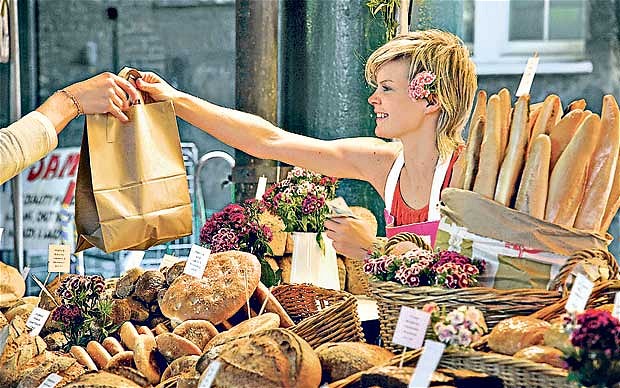My friend Cathy once paid £9 for a small bag of green beans from an organic deli because she ‘wanted to support local businesses’. But this shop, in trendy Crouch End (a leafy, north London suburb), was actually part of a chain of organic rip-off merchants, filled with over-priced fruit and vegetables half eaten by snails. The owners were raking it in from idiots who had this mad idea that the shop was there to ‘serve the community’. It existed to make the owners very rich off the back of folk with more money than sense.
Ditto farmers’ markets. A few minutes walk from the green bean shop is the place where the urban, monied middle classes go to cruise other urban, monied middle classes. These people, often affecting the appearance of country-dwellers, are so pleased with themselves for buying food with no carbon footprint. The sellers crow about the fact that the cabbages were picked fresh from Kent that morning. But so what? No one can tell the difference between that and a plastic-wrapped offering from Aldi if it were stripped of its packaging.
There is a sense from some farmer’s market devotees that they are somehow doing the environment, and poor people, the world of good by spending obscene amounts of easily earned cash on a bag of posh tomatoes. They can be heard bragging, as they queue for their double-filtered Ethiopian coffee, that they are handing their dosh straight into the hands of those tasked with providing food for the nation.
But these farmers are nothing like the hard-working, hard-up manual labourers that struggle to make ends meet. These are the public school-educated fancy-pant lot who are appealing to snobbery and elitism. For many of them, it’s just a hobby. And the customers are as smug and self-satisfied a group as you will ever meet, walking around looking pleased with themselves because they’re doing their shopping outdoors and clutching natural-fibre reusable bags, rather than enclosed with commoners buying battery-farmed eggs.
Pretty much everything is wildly overpriced, ergo, only over-privileged, time-rich individuals can afford to buy it. I could take along a load of crap in a hessian basket woven by impoverished Guatemalan peasants, and clear up within five minutes. If the actual peasant was selling it directly it wouldn’t work; those peddling goods at markets have to be as posh as the people they are serving. But half the time the customers do not see themselves as doing the food shopping; they think they’re saving the planet and securing a place in secular heaven.
All normal shopping protocols are obsolete in famers’ markets. The more mud on the potatoes, misshapen the apples and cracked the terracotta pots the better. The fake farmers selling you the tat are inevitably rude and superior, managing to give you the impression that you should be grateful that they arrived in their shiny Chelsea tractor packed with food you could buy for an eighth of the price in your local supermarket – yes, that much-derided place that makes it easier for older, disabled and hard-up people to buy a weekly shop and that actually provides jobs for people who need them.
The sheer snobbery of the market dwellers makes me want to run to the nearest Bargain Booze – via Morrisons. Maybe these people will think twice about eating organic when they find themselves out of a job, or facing a pay cut. Certainly, those selling the swag will be laughing all the way to their Tuscan farmhouse for a well-deserved break from ripping everyone else off.
Julie Bindel is the author of Straight Expectations: What Does It Mean To Be Gay Today? (Guardian Books)







Comments